|
|
|
Sort Order |
|
|
|
Items / Page
|
|
|
|
|
|
|
| Srl | Item |
| 1 |
ID:
109196
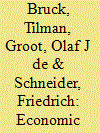

|
|
|
|
|
| Publication |
2011.
|
| Summary/Abstract |
In this article, we estimate the total costs of the German participation in the Afghanistan war, both past and future. This is a hugely complex and uncertain calculation, which depends on several important assumptions. These assumptions pertain to the different cost channels and the shares of these channels that can be attributed to the German participation in the war. By calculating the costs of the German participation, we provide a framework for other researchers to do the same with respect to other countries. The article can function as a roadmap for researchers focusing on this topic. In the end we find that, in the most realistic of several possible scenarios regarding the duration and intensity of the German participation in the war in Afghanistan, the German share of the net present value of the total costs of the war ranges from 26 billion Euro to 47 billion Euro. This large range reflects the uncertainties with which the costs must be estimated. On an annual basis, we estimate that the German participation in the war costs between 2.5 and 3 billion Euro. This contrasts with the official war budget, which is little over 1 billion Euro for 2010, showing that governments may not adequately represent the costs of military action.
|
|
|
|
|
|
|
|
|
|
|
|
|
|
|
|
| 2 |
ID:
133713
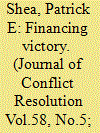

|
|
|
|
|
| Publication |
2014.
|
| Summary/Abstract |
With access to inexpensive credit, states can finance wars without overburdening their constituents, and face relatively small short-term costs compared to states with poor credit access. As a result of these economic benefits, states with lower credit costs will be more likely to win their wars, ceteris paribus. However, lower borrowing costs provide states domestic political benefits, which I argue are more important for democracies than nondemocracies. Since expensive credit forces states to rely on its citizens for revenue, governments that are more sensitive to their citizens' preferences are at a disadvantage. In sum, I argue that democracies are more sensitive to credit costs than authoritarian regimes. To test this theory, this article analyzes a data set of wars using logistic regressions and matching techniques, and examines the case of the Chaco War. The results demonstrate that the costs of borrowing have a substantial effect on war outcomes, and that these costs are more important for democracies than nondemocracies.
|
|
|
|
|
|
|
|
|
|
|
|
|
|
|
|
| 3 |
ID:
127836
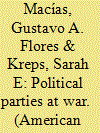

|
|
|
|
|
| Publication |
2013.
|
| Summary/Abstract |
What determines when states adopt war taxes to finance the cost of conflict? We address this question with a study of war taxes in the United States between 1789 and 2010. Using logit estimation of the determinants of war taxes, an analysis of roll-call votes on war tax legislation, and a historical case study of the Civil War, we provide evidence that partisan fiscal differences account for whether the United States finances its conflicts through war taxes or opts for alternatives such as borrowing or expanding the money supply. Because the fiscal policies implemented to raise the revenues for war have considerable and often enduring redistributive impacts, war finance-in particular, war taxation-becomes a high-stakes political opportunity to advance the fiscal interests of core constituencies. Insofar as the alternatives to taxation shroud the actual costs of war, the findings have important implications for democratic accountability and the conduct of conflict.
|
|
|
|
|
|
|
|
|
|
|
|
|
|
|
|
| 4 |
ID:
148160
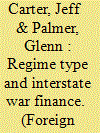

|
|
|
|
|
| Summary/Abstract |
Governments can finance the higher military spending associated with interstate war through a combination of cutting nonmilitary spending, imposing higher taxes, borrowing, and adopting an inflationary monetary policy. We argue that the incentives of survival-motivated leaders influence the strategies governments use to fund their war efforts and that regime type conditions the use of some finance strategies. Consistent with our expectations, we find that fighting an interstate war is associated with greater reductions in nonmilitary spending in dictatorships than in democracies and that contemporary democracies and dictatorships have largely avoided financing their wars through tax increases and inflation. We find little support for the argument that democracies finance their interstate wars through greater debt than nondemocracies.
|
|
|
|
|
|
|
|
|
|
|
|
|
|
|
|
| 5 |
ID:
186163
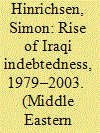

|
|
|
|
|
| Summary/Abstract |
In 1979 Iraq was a net creditor to the world. Fifteen years later, its government debt-to-GDP was over 1,000 per cent. At the time of the US invasion in 2003, Iraq was saddled with around 130 billion US dollars in external debt. How does a country incur so much debt, so fast? In answering this question, the article reconstructs the build-up of Iraqi debt through the 1980s and 1990s. This article is the first to create a debt series going back to 1979. The rise in Iraqi indebtedness was a consequence of global geopolitical trends in the 1980s where political lending trumped solvency concerns. It allowed Iraq to obtain financing on terms more favourable than the US government, without conditionality of reform.
|
|
|
|
|
|
|
|
|
|
|
|
|
|
|
|
| 6 |
ID:
191907
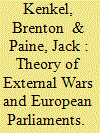

|
|
|
|
|
| Summary/Abstract |
The development of parliamentary constraints on the executive was critical in Western European political history. Previous scholarship identifies external wars as a key factor, but with varying effects. Sometimes, willing monarchs granted parliamentary rights in return for revenues to fight wars. Yet at other times, war threats empowered rulers over other elites or caused states to fragment. We analyze a formal model to understand how external wars can either stimulate or undermine prospects for a contractual relationship between a ruler and elite actors. We recover the standard intuition that war threats make the ruler more willing to grant parliamentary rights in return for revenue. Our key insight is that war threats also affect the bargaining position of elites. A previously unrecognized tension yields our new findings: stronger outsider threats increase pressure either on elites to fund the ruler or on the ruler to accept constraints—but not both simultaneously. Elites with immobile wealth depend on the ruler for security. War threats undercut their credibility to refuse funding for an unconstrained ruler. By contrast, war threats make elites with mobile wealth and a viable exit option unwilling to fund a hopeless war effort. Only under circumscribed conditions do war threats align three conditions needed for parliament to arise in equilibrium: ruler willingness, elite credibility, and elite willingness. We apply our theory to posit strategic foundations for waves and reversals of historical European parliaments.
|
|
|
|
|
|
|
|
|
|
|
|
|
|
|
|
|
|
|
|
|